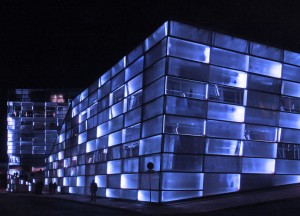Fassadenfestival

Foto: rubra
Fr 4.9. 19:30 – 21:00
Ars Electronica Center
SkyLoft
Behind the Façade I
19:30
Intro: LED-Façade of the AEC (Christopher Lindinger, Ars Electronica Futurelab, AT)
20:00
Interaktion durch 40.000 LEDs (Markus Schernhuber, MultiVision, AT/German only)
20:30
Simulating the Façade (Andreas Pramböck, Ars Electronica Futurelab, AT)
Moderation: Christopher Lindinger
Mo 7.9. 21:00 – 23:00
Ars Electronica Center
SKY
Behind the Façade II
Christopher Lindinger und Roland Haring (Ars Electronica Futurelab, AT) eröffnen ein Forum für Inszenierungskonzepte der AEC Fassade. Im Forum stellen Universitäten ihre im Rahmen des Festivals präsentierten interaktiven, audiovisuellen und visuellen Fassadenbespielungen inhaltlich und technisch vor. Daniel Wilcox (Ars Electronica Futurelab, AT/US) zeigt eine Live-Perfomance im Zusammenspiel mit der Fassade.
Christopher Lindinger (AT) Christopher Lindinger Studied Computer Science at the University of Linz and Cultural Management in Salzburg. He worked as researcher in the field of scientific visualisation and as freelance developer for entertainment industry. Since 1997, based on his activities in the field of digital art, he is affiliated with the Ars Electronica and currently holds the position of the director of research and innovation in the Ars Electronica Futurelab. Beside this activity he works as a lecturer at several universities in Austria, Germany and UK.
Interaktion durch 40.000 LEDs
Das Ars Electronica Center umhüllt seit 1. Jänner 2009 eine der größten LED-Fassaden Europas. Dank modernster LED-Technologie werden selbst fließende Bewegungen und Farbverläufe optimal umgesetzt. Die mit 40.000 LEDs bestückte Fassade bietet Künstlern aus der ganzen Welt eine einzigartige Kommunikationsplattform. Neben unendlichen Bespielungsvarianten zeichnet sich die Lichtinstallation durch eine hohe Energieeffizienz und lange Lebensdauer aus.
Markus Schernhuber (AT) Markus Schernhuber ist Mitbegründer und geschäftsführender Gesellschafter der Multivision Anzeigensysteme GmbH. Das seit 8 Jahren bestehende Unternehmen ist auf LED-Sonderlösungen für Fassaden, Anzeigen und Shopdisplays spezialisiert. Zuvor hat der gelernte Elektrotechniker über 15 Jahre Erfahrungen im Spezialbereich Ton- und Lichttechnik für die Event- und Entertainmentbranche gesammelt.
Simulating the Facade
The AEC facade should be an open environment for artists, students, programmers etc. to create projects and performances for this unique building. The AEC Facade Simulator and Control is a tool that simplifies the interface to the real hardware and that gives you a very realistic preview of how a performance will look like on the building. It provides a network interface, that can be used by any programming language or programming environment, that can use IP protocols. It allows development of projects completely off-line. Using the real facade instead of a simulation is just switching a button.
The session introduces the AEC Facade Simulator and Control application and talks about the do’s and dont’s when developing for the facade.
Andreas Pramböck (AT) 1965: born in Grieskirchen, Upper Austria.
1975-1983: Gymnasium in Wels
1983-1984: Member of the Military Band of Upper Austria
1984-1990: Student of Computer Science at Johannes Kepler University Linz: Focus on Software Engineering and Compiler Development
1985-1989: Student of Music Performance at Bruckner-Konservatorium Linz
1987-1988: Member of the scientific staff at the department of Compiler Development at Johannes Kepler University.
1988-2007: Lead Software Developer at Fabasoft: Focus on Distributed Systems, Databases, Object-Oriented Programming, Software Quality, Project Management
2007-now: Key Researcher for Creative Engineering in the Ars Electronica Futurelab
Roland Haring (AT) Roland Haring studied media technology and design at Hagenberg Technical College. A recent highpoint of his successful collaboration with the Ars Electronica Futurelab was “Gulliver’s World,” a complex Mixed Reality project that has been singled out for recognition with numerous prizes in Austria and abroad. Now, as key researcher for Mobile Interaction Design, Roland Haring is an important member of the Futurelab staff and a driving force behind the lab’s R&D efforts. His current activities include a major joint venture at the interface of academic research, commercial interests and the mission of the Ars Electronica Center. On the side, he’s at work on a doctoral dissertation dealing with interation metaphors for location-based information on mobile systems.
